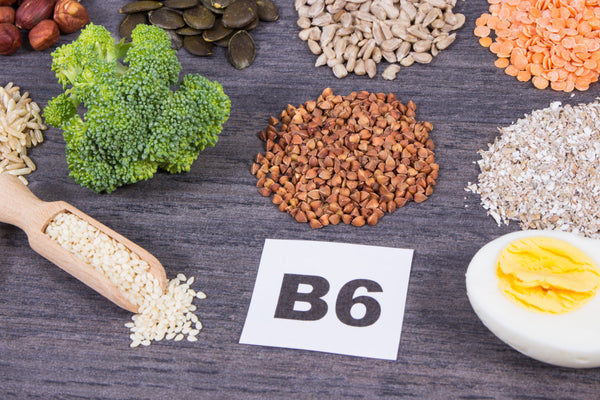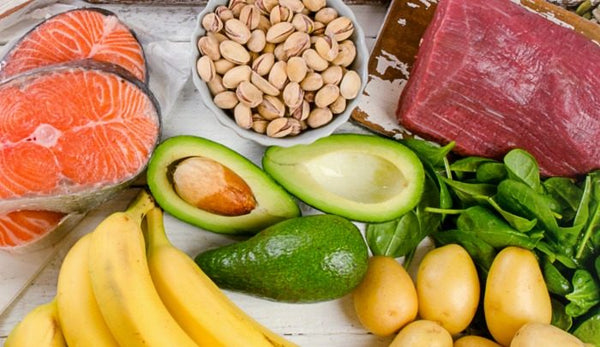
Vitamin B and Their Various Benefits

Often we hear that vitamin B have many benefits, but we don't really understand what and how these B vitamins affect our health.
In this article we will introduce you to the vitamin B, explore their functions as well as their main food sources and will discuss the symptoms of each B vitamin deficiency.
What are B vitamins?
The B vitamins are a group of eight essential nutrients that play a role in many organs and body systems.
Although they collaborate in the body, they can also carry out their own unique functions.
These B vitamins are important for ensuring the body's cells function properly. They help the body to convert food into metabolic energy, make new blood cells and maintain healthy skin cells, brain cells and other body tissues.
There are 8 types of Vitamin B, which have their own functions and benefits:
- Thiamine (vitamin B-1)
- Riboflavin (vitamin B-2)
- Niacin (vitamin B-3)
- Pantothenic acid (vitamin B-5)
- Vitamin B-6
- Biotin (vitamin B7)
- Folate (vitamin B9)
- Vitamin B-12
Together they are all referred to as vitamin B complexes. You can get B vitamins with a variety of nutrient-dense foods.
However, if there are people who have difficulty meeting their daily needs, they can use supplements.
People can become deficient in B vitamins if they don't get enough vitamins from food or supplements.
They may also become deficient if the body cannot absorb nutrients properly or if the body excretes too many nutrients due to certain health conditions or medications.
Daily Value of Vitamin B

Health experts recommend that people get a certain amount of each vitamin per day to maintain a healthy body.
The following table will show the daily value (DV) of each B vitamin according to the US Food and Drug Administration (FDA) in milligrams (mg) or micrograms (mcg):
|
Vitamin |
DV for Adults and children ages 4+ |
DV if pregnant or breastfeeding |
|
Thiamine (B-1) |
1.2 mg |
1.4 mg |
|
Riboflavin (B-2) |
1.3 mg |
1.6 mg |
|
Niacin (B-3) |
16 mg or equivalent |
18 mg or equivalent |
|
Pantothenic acid (B-5) |
5 mg |
7 mg |
|
Vitamin B-6 |
1.7 mg |
2 mg |
|
Biotin (B-7) |
30 mcg |
35 mcg |
|
Folate (B-9) |
400 mcg or equivalent |
600 mcg or equivalent |
|
Vitamin B-12 |
2.4 mcg |
2.8 mcg |
Explanation Each of these B complex vitamins will be discussed in more detail below.
Thiamine (vitamin B-1)
Human organs such as the heart, liver, kidneys all contain thiamine . The human body needs thiamine to:
- Break down sugar molecules (carbohydrates) from food
- Create certain neurotransmitters ( brain chemicals)
- Produce fatty acids
- Synthesize certain hormones
Thiamine Foods
Foods that contain thiamine are:
- Fortified grains and breads such as cereals, pasta and bread Rice
- Trout
- Scallops
- Acorn squash
- Legumes such as black beans and soybeans
- Seeds
- Peanuts
People who are prone to Thiamine deficiency Thiamine
Deficiency will be experienced by people such as:
- Those who are dependent on alcohol
- Elderly people
- Those with HIV or AIDS
- People with diabetes
- Heart failure
Symptoms Thiamine deficiency
A person with a thiamine deficiency will experience:
- Weight loss
- Little or no appetite
- Memory problems or confusion
- problems Heart
- Numbness and tingling in the feet and hands
- Loss mass muscle
- Poor reflexes
Riboflavin (vitamin B-2)

Riboflavin is very important for the body that is for:
- Energy production
- Improve the body's function to break down fat, hormones, steroids and drugs.
- Converts tryptophan to niacin
- Converts vitamin b-6 into a coenzyme the body needs=
Food sources of riboflavin
Foods rich in riboflavin include:
- meats Organ
- Breakfast cereals fortified with vitamin B-2
- Oats
- Yogurt and milk
- Mushrooms
- Almonds
Symptoms of Riboflavin deficiency The
Following are symptoms of riboflavin deficiency
- Skin disorders
- Sores at the corners of the mouth
- Swelling of the mouth and throat
- Swollen and cracked lips
- Hair loss
- Red and itchy eyes
Severe riboflavin deficiency can cause anemia and cataracts. Riboflavin deficiency during pregnancy can increase the risk of certain birth defects.
People at risk for riboflavin deficiency The
following are people at high risk for riboflavin deficiency, including:
- Those who follow a vegan diet or who do not consume dairy products
- Athletes who do not eat meat, especially those who also do not drink milk or other animal products.
- Women who are pregnant or breastfeeding, especially those who do not consume dairy products or meat
Niacin (vitamin B-3)
The body can convert niacin to a coenzyme called nicotinamide adenine dinucleotide (NAD).
This NAD is an essential part of over 400 different enzyme reactions in the body, the highest of all vitamin-derived coenzymes. This enzyme helps with:
- Converting energy in carbohydrates, fats and proteins into a form that the body can use
- Metabolic processes in the body's cells
- Communication between cells
- Expression of DNA in cells
Foods containing Niacin
Animal foods such as meat, poultry and fish high in NAD can be easily used by the body.
Plant foods including nuts, legumes and seeds contain a natural form of niacin that the body cannot use easily.
However, manufacturers add niacin to foods such as cereals and the body can easily use it in this form.
Symptoms of niacin deficiency
People who have a deficiency or too little of niacin can have severe pellagra, which is:
- Brown discoloration of the skin exposed to the sun
- Skin patches with a rough appearance
- Bright red tongue
- Vomiting, diarrhea, or constipation
- Fatigue
- Headaches
- Depression
If pellagra is not treated immediately If treated it will result in severe memory problems, behavioral changes and suicidal behavior. Moreover it can lead to a lack of appetite or even to extreme death.
People at risk for niacin deficiency include those who have:
- Malnutrition
- Anorexia nervosa
- Alcohol use disorders
- AIDS
-
Inflammatory bowel disease (IBD)
Pantothenic acid (B5)
Pantothenic acid is needed by the body to produce new proteins, coenzymes, and fats.
Red blood cells that carry pantothenic acid throughout the body so that it can use nutrients in various processes for energy and metabolism.
Foods with pantothenic acid
Below are foods with the highest amount of pantothenic acid, including:
- Beef liver
- Shitake mushrooms
- Sunflower seeds
- Chicken
- Tuna
- Avocado
- Vitamin B-5 fortified breakfast cereal
Symptoms of pantothenic acid deficiency
- Burning or numbness in the feet and hands
- Pain Headache
- Irritability
- Restlessness and lack of sleep
- Lack of appetite
Vitamin B-6

Vitamin B6 or pyridoxine plays a role in more than 100 enzyme reactions the body needs this vitamin for:
- metabolism Amino acid
- Break down carbohydrates and fats
- Immune function
Foods vitamin B-6
Foods with good sources richest sources of vitamin B-6 include:
- Organ meats
- Beans
- Tuna
- Salmon
- Poultry
- Potatoes
Symptoms of vitamin B-6 deficiency
Vitamin B-6 deficiency can cause:
- Anemia Chapped
- lips
- Cracks at the corners of the mouth
- Swollen tongue
- A weakened immune system
- Confusion
- Depression
People at risk for vitamin B6 deficiency
The following people are at risk for vitamin B-6 deficiency:
- Kidney disease
- Ever transplant kidney
- Celiac
- disease Ulcerative colitis
- Autoimmune disorders
Biotin (vitamin B7)
Many manufacturers add biotin to many hair, skin and nail supplements. Some people believe that nicotine can help psoriasis.
The human body needs biotin to:
- Break down fats, carbohydrates and proteins
- Communication between cells in the body
- DNA regulation
Foods with biotin
- Organ meats
- Eggs
- Salmon
- Beef
- Sunflower seeds
Symptoms of biotin deficiency:
- Thinning hair
- A scaly rash on the nose, eyes and mouth.
- nails Brittle
- depression
- Fatigue
People at risk for biotin deficiency:
- People with a metabolic disorder called biotinidase
- People with alcohol use disorders
- Pregnant or breastfeeding women
Folate (vitamin B-9)

Vitamin B9 is also known as folate. Folic acid present in fortified foods and some supplements is a synthetic form of the vitamin.
Because most people can't eat enough green leafy vegetables to the required level especially during pregnancy.
Thus, the Centers for Disease Control and Prevention (CDC) recommends that all women of reproductive age who wish to become pregnant consume 400 mcg of folic acid daily in addition to eating a varied diet containing folate.
Folate is also important for:
- DNA replication
- Vitamin
- metabolism Amino acid metabolism
- Proper cell division
Foods that contain folate
- Dark green leafy vegetables
- Beef liver
- Avocado
- Papaya
- Orange juice
- Eggs
- Peas Peas
Symptoms of folate deficiency
- Weakness
- Headaches
- on Cardiac
- the
- capitalization Irritability Sores tongue and in the mouth
- Changes in the skin, hair or nails
Vitamin B-12
Vitamin B12 has the mineral cobalt or commonly known as cobalamin. Our bodies use vitamin B12 to:
- Make new red blood cells
- DNA synthesis
- function Brain and neurological
- Fat and protein metabolism
Foods vitamin B12:
Vitamin B12 occurs naturally in the following animal products:
- Mussels
- Beef liver
- Salmon
- Beef
- Milk and yogurt
People who don't eat Animal products may need to get vitamin B-12 from supplements or fortified foods such as cereals and nutritional yeast.
Deficiency of Vitamin B-12:
Vitamin B12 deficiency usually causes a condition called megaloblastic anemia. Symptoms of this deficiency include:
- Fatigue
- Weight loss
- Constipation
- Loss of appetite
- Having tingling or numbness in the hands and feet
- Memory problems
- Depression
Vitamin B supplements
Most vitamin supplements contain some of each of the B vitamins and many provide 100% or more of a person's daily requirement for every vitamin.
Researchers state that most people have deficiencies and would benefit from high doses of B complex supplements.





